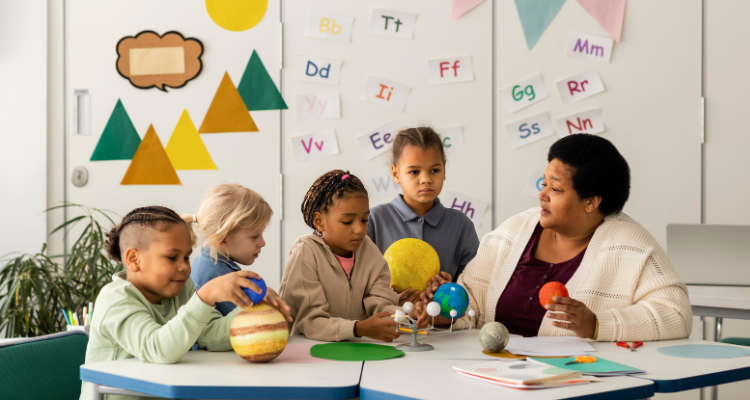Reasons Why Early Learning is Essential for Children

Early learning plays a crucial role in the development of children. It's during the early years that their brains experience significant growth and make important neural connections that lay the groundwork for future learning capacity. Investing in early education not only benefits the child but also society as a whole. Ensuring children have access to quality learning experiences in their formative years can lead to better outcomes throughout their lives. Below are several reasons why early learning is vital for children.
Brain Development
The early years are a period of remarkable brain development. According to the National Institute for Early Education Research, by age five, a child’s brain is about 90% of an adult’s size, and the majority of neural connections are formed during this time. This rapid growth allows children to acquire language, social skills, and cognitive development skills more effectively. Neuroplasticity, the brain's ability to reorganize itself by forming new neural connections, is more pronounced in early childhood. Engaging children in stimulating learning environments nurtures this growth and helps set a strong foundation for lifelong learning.
Social Skills Development
Children learn social skills in their early years through games, interaction with peers, and collaborative play. Early childhood education provides countless opportunities for children to engage with their peers, teaching them how to communicate effectively, share, and work in teams. According to the Collaborative for Academic, Social, and Emotional Learning (CASEL), children who participate in structured early learning experiences are more likely to develop positive social behaviors. These interactions help them build empathy, resilience, and conflict resolution skills that are crucial for their future social interactions.
Emotional Growth and Resilience
Young children experience a wide range of emotions, and it is important that they learn how to manage these feelings in a healthy way. Early learning environments offer children the chance to express themselves and develop emotional intelligence. Studies from the Harvard Graduate School of Education show that children exposed to positive early learning experiences tend to have better emotional regulation. This means they can cope with challenges more effectively, leading to a greater sense of resilience. Learning to navigate emotions during childhood prepares them to face the ups and downs of life with confidence.
Language Acquisition
Exposure to language-rich environments is essential for effective language development. Children who are immersed in conversation and provided with various linguistic experiences are more likely to expand their vocabulary and comprehension skills. According to the American Academy of Pediatrics, children who engage in conversations and reading with adults tend to have stronger literacy skills when they enter school. Enrolling children in Montessori childcare and other early learning settings provides children with opportunities to explore language through storytelling, songs, and engaging dialogues, fostering excitement around learning. The more words kids know, the better they can express themselves and connect with the world around them.
Academic Readiness
The transition to formal schooling can be daunting for many children. Early learning programs help bridge the gap between informal learning and formal academia. A study published in the Journal of Educational Psychology found that children who participated in high-quality preschool programs performed better academically in later grades. For parents planning for their children’s coming school year, this is an excellent preparation for their kids. When children have the tools and confidence to face academic challenges, they are more likely to succeed in school. Well-rounded early childhood education prepares them for the curriculum they will encounter in primary school.
Long-Term Benefits
The positive effects of early learning extend well beyond just academic success. Research from the Rand Corporation indicates that quality early childhood education can lead to higher graduation rates and increased earnings in adulthood. Children exposed to early learning environments are also less likely to engage in criminal behavior and more likely to become responsible citizens. The societal benefits derived from investing in early education programs significantly outweigh the costs, making a compelling case for policymakers.
Holistic Development
Early learning experiences often take a holistic approach, focusing on the all-encompassing development of the child—intellectual, emotional, social, and physical. Quality programs incorporate activities that promote physical exercise, such as outdoor play and movement activities, which enhance physical health while also improving cognitive function. This well-rounded approach equips children with a diverse set of skills that support their overall development, preparing them for a successful future. Research from the National Early Childhood Program Accreditation emphasizes that holistic development leads to a better quality of life and overall well-being.
Increased Parental Involvement
Early learning programs often encourage parental engagement, creating stronger family bonds while fostering a supportive learning environment. When parents are involved in their child's education from an early age, it helps them understand the importance of education and motivates their children to succeed. Additionally, many programs offer resources and workshops that teach parents how to support their children's learning at home. Increased involvement from parents correlates with better educational outcomes for children, highlighting the importance of community and family in the learning process.
Accessibility and Equality
Ensuring access to early learning opportunities is critical in promoting equality. Many children from underprivileged backgrounds may not have access to quality early education, putting them at a disadvantage. Expanding early learning initiatives and programs can help bridge this gap. Research from the Pew Charitable Trusts shows that access to high-quality early education for low-income families leads to improved academic achievements and social outcomes for their children. Every child deserves the chance to thrive, regardless of their socioeconomic background.
Cognitive Skills and Critical Thinking
Early education contributes significantly to the development of cognitive skills and critical thinking abilities. Programs that emphasize problem-solving and exploration encourage children to think independently and analyze situations rigorously. Studies indicate that children engaged in educational play demonstrate higher-order thinking skills, which serve them well not only in school but throughout their lives. Learning through experimentation and discovery nurtures curiosity, encouraging children to ask questions and seek answers.

Early learning is fundamental for children’s holistic development, equipping them with essential skills they will carry throughout their lives. From academic readiness to emotional intelligence and critical thinking, the benefits of investing in early education programs impact not only the individual child but society as a whole. Ensuring that children have access to quality early learning experiences is crucial for fostering their potential and helping them become successful, contributing members of society. Early education is not just an option—it's an essential component of fostering a bright future for all children.



